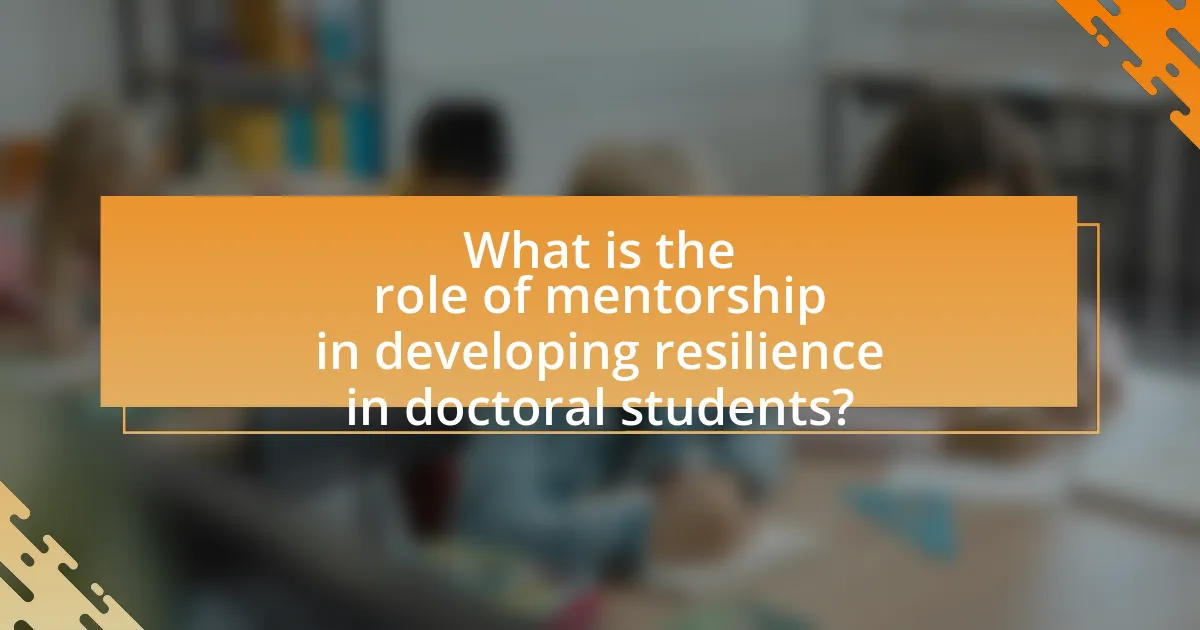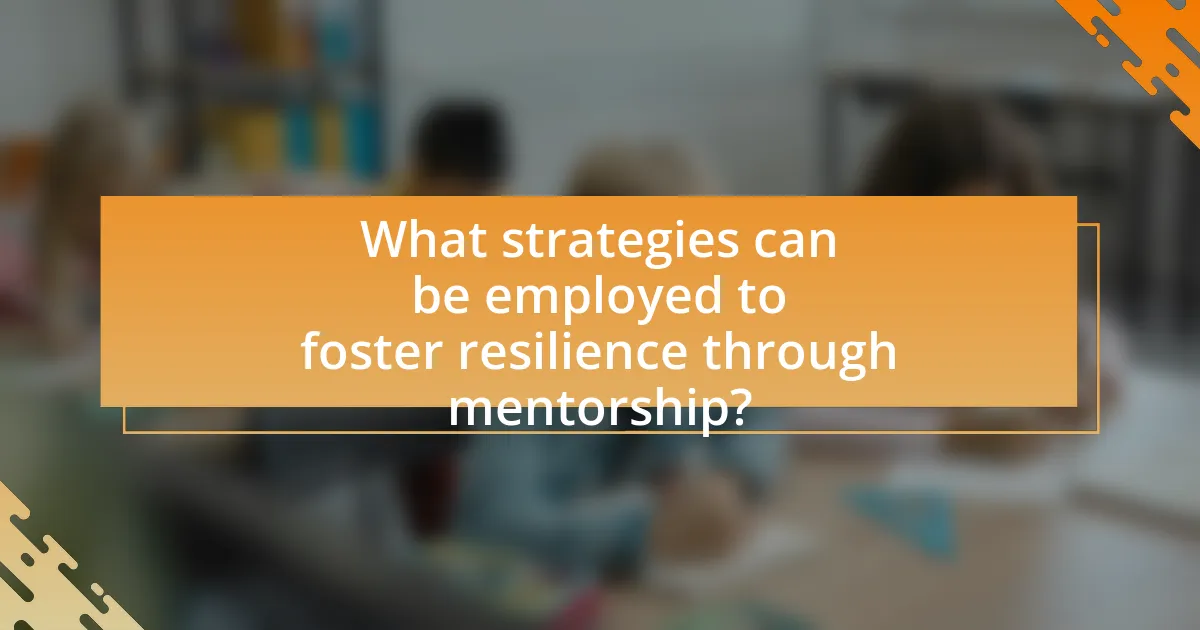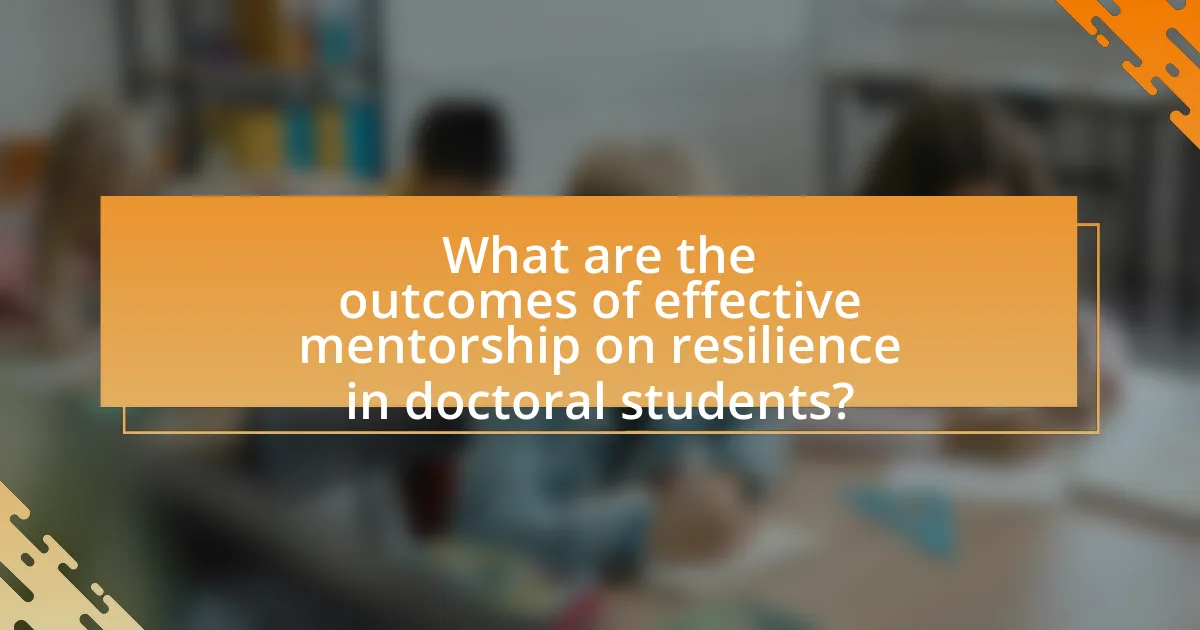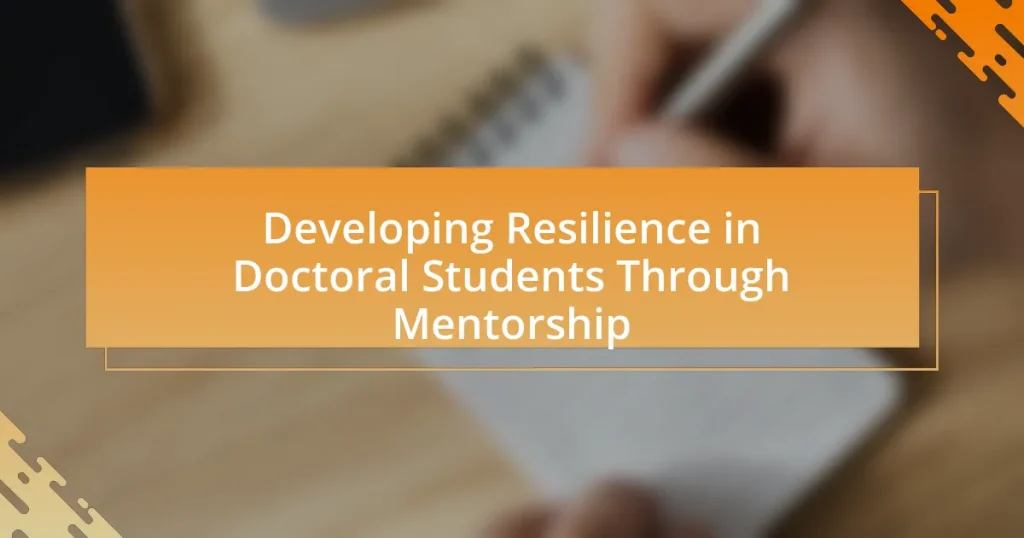The article focuses on the critical role of mentorship in developing resilience among doctoral students. It outlines how effective mentorship provides essential guidance, emotional support, and coping strategies that help students navigate the challenges of their academic journey. Key topics include the specific challenges faced by doctoral students, the characteristics of resilience, and the impact of mentorship on academic performance and retention rates. Additionally, the article discusses strategies for mentors to foster resilience, including promoting a growth mindset and creating a supportive environment, while highlighting the positive correlation between mentorship and student well-being.

What is the role of mentorship in developing resilience in doctoral students?
Mentorship plays a crucial role in developing resilience in doctoral students by providing guidance, support, and a framework for navigating challenges. Effective mentors help students build coping strategies, enhance problem-solving skills, and foster a growth mindset, which are essential components of resilience. Research indicates that mentorship positively impacts students’ emotional well-being and academic persistence, as evidenced by a study published in the Journal of Higher Education, which found that mentored students reported higher levels of resilience and lower levels of stress. This supportive relationship enables doctoral students to face setbacks with greater confidence and adaptability, ultimately contributing to their success in completing their programs.
How does mentorship influence the academic journey of doctoral students?
Mentorship significantly influences the academic journey of doctoral students by providing guidance, support, and resources essential for their success. Effective mentorship fosters resilience by helping students navigate challenges, enhancing their research skills, and promoting professional development. Studies indicate that doctoral students with mentors report higher levels of satisfaction and are more likely to complete their programs. For instance, a study published in the “Journal of Higher Education” by Johnson and Huwe (2019) found that mentorship positively correlates with academic performance and emotional well-being, highlighting the critical role mentors play in shaping the doctoral experience.
What specific challenges do doctoral students face that mentorship can address?
Doctoral students face several specific challenges that mentorship can effectively address, including isolation, lack of guidance, and stress management. Isolation often leads to feelings of loneliness and disconnection from the academic community, which mentorship can alleviate by providing a supportive relationship and networking opportunities. Lack of guidance in navigating complex research processes and academic expectations can be mitigated through mentorship, as experienced mentors offer insights and advice based on their own experiences. Additionally, stress management is crucial for doctoral students, and mentors can share coping strategies and resources to help students develop resilience in the face of academic pressures. These challenges are well-documented in studies, such as those by Golde and Dore (2001), which highlight the importance of mentorship in enhancing doctoral student experiences and outcomes.
How can mentors provide emotional support to doctoral students?
Mentors can provide emotional support to doctoral students by actively listening to their concerns and validating their feelings. This approach fosters a safe environment where students feel comfortable expressing their challenges, which is crucial for their emotional well-being. Research indicates that supportive mentorship positively impacts students’ resilience and academic success, as seen in a study by G. L. McAlpine and J. A. Amundsen, published in “Studies in Higher Education,” which highlights the importance of emotional support in the doctoral journey. By offering guidance, encouragement, and constructive feedback, mentors help students navigate the emotional ups and downs of their academic experience, ultimately enhancing their resilience.
Why is resilience important for doctoral students?
Resilience is crucial for doctoral students because it enables them to navigate the challenges and setbacks inherent in advanced academic research. Doctoral programs often involve high levels of stress, uncertainty, and the potential for failure, which can lead to feelings of isolation and discouragement. Resilient students are better equipped to cope with these pressures, maintain motivation, and persist in their studies despite obstacles. Research indicates that resilience is linked to improved academic performance and mental well-being, highlighting its importance in fostering a successful doctoral experience.
What are the key characteristics of resilience in the context of doctoral studies?
The key characteristics of resilience in the context of doctoral studies include adaptability, perseverance, emotional regulation, and a strong support network. Adaptability allows doctoral students to adjust their research approaches and cope with unexpected challenges, which is crucial given the unpredictable nature of academic research. Perseverance is essential for maintaining motivation and commitment despite setbacks, as doctoral studies often involve prolonged periods of uncertainty and difficulty. Emotional regulation helps students manage stress and anxiety, enabling them to maintain focus on their goals. Lastly, a strong support network, including mentors and peers, provides emotional and practical assistance, which has been shown to enhance resilience and improve overall academic performance. Research indicates that these characteristics collectively contribute to a higher likelihood of completing doctoral programs successfully.
How does resilience impact the success and well-being of doctoral students?
Resilience significantly enhances the success and well-being of doctoral students by enabling them to effectively cope with academic challenges and stressors. Research indicates that resilient students are more likely to persist in their studies, maintain motivation, and achieve higher academic performance. For instance, a study published in the Journal of Educational Psychology found that resilience is positively correlated with academic success, as resilient students demonstrate better problem-solving skills and adaptability in the face of setbacks. Furthermore, resilience contributes to improved mental health outcomes, reducing the likelihood of anxiety and depression among doctoral candidates, which is crucial for their overall well-being.

What strategies can be employed to foster resilience through mentorship?
To foster resilience through mentorship, strategies such as establishing a supportive relationship, promoting open communication, and setting realistic goals can be employed. A supportive relationship allows mentees to feel safe sharing challenges, which is crucial for building resilience. Open communication encourages feedback and discussions about setbacks, helping mentees learn to navigate difficulties. Setting realistic goals provides a clear path for achievement, allowing mentees to experience success incrementally, which reinforces their resilience. Research indicates that mentorship significantly impacts resilience development, as seen in a study by Gibbons et al. (2018) published in the Journal of Educational Psychology, which found that effective mentorship correlates with increased resilience in doctoral students.
How can mentors effectively communicate with their mentees?
Mentors can effectively communicate with their mentees by establishing open lines of communication, actively listening, and providing constructive feedback. Open communication fosters trust, allowing mentees to express their concerns and aspirations freely. Active listening ensures that mentors fully understand their mentees’ perspectives, which is crucial for addressing their specific needs. Constructive feedback helps mentees identify areas for improvement and encourages their growth. Research indicates that effective communication in mentorship relationships significantly enhances the resilience of doctoral students, as it provides them with the support and guidance necessary to navigate challenges in their academic journey.
What techniques can mentors use to build trust and rapport with doctoral students?
Mentors can build trust and rapport with doctoral students by actively listening, providing constructive feedback, and demonstrating empathy. Active listening involves fully engaging with students’ concerns and ideas, which fosters an environment of openness and respect. Providing constructive feedback helps students understand their strengths and areas for improvement, reinforcing their growth and development. Demonstrating empathy allows mentors to connect with students on a personal level, showing that they care about their well-being and academic journey. Research indicates that these techniques contribute to a supportive mentoring relationship, which is crucial for developing resilience in doctoral students.
How can mentors encourage a growth mindset in their mentees?
Mentors can encourage a growth mindset in their mentees by fostering an environment that values effort, learning from mistakes, and resilience. This can be achieved through specific strategies such as providing constructive feedback, emphasizing the importance of perseverance, and modeling a positive attitude towards challenges. Research indicates that when mentors highlight the process of learning rather than just the outcomes, mentees are more likely to adopt a growth mindset. For instance, a study by Dweck (2006) found that individuals who receive praise for their effort rather than their intelligence are more inclined to embrace challenges and persist in the face of setbacks.
What types of mentorship models are most effective for developing resilience?
The most effective mentorship models for developing resilience include the transformational mentorship model and the peer mentorship model. The transformational mentorship model emphasizes personal growth and emotional support, fostering a strong mentor-mentee relationship that encourages resilience through guidance and encouragement. Research indicates that mentors who provide emotional support and challenge mentees to step outside their comfort zones significantly enhance resilience (Crisp & Cruz, 2009).
The peer mentorship model, on the other hand, promotes mutual support among individuals at similar stages in their academic journey, allowing for shared experiences and collective problem-solving. This model has been shown to create a supportive environment that enhances resilience by normalizing challenges and fostering a sense of community (Baker et al., 2016).
Both models effectively contribute to resilience development by providing essential support systems and fostering adaptive coping strategies in doctoral students.
What are the differences between formal and informal mentorship in doctoral programs?
Formal mentorship in doctoral programs is structured and typically involves a designated mentor-mentee relationship with specific goals and expectations, while informal mentorship is more spontaneous and can arise from personal connections without formal agreements. Formal mentorship often includes scheduled meetings, defined roles, and institutional support, which can enhance accountability and provide clear guidance for academic and professional development. In contrast, informal mentorship relies on personal rapport and may offer flexibility and a more relaxed environment for sharing experiences and advice. Research indicates that both types of mentorship contribute to resilience in doctoral students, but formal mentorship tends to provide more systematic support, as evidenced by studies showing that structured mentorship programs lead to higher completion rates and greater satisfaction among doctoral candidates.
How can peer mentorship contribute to resilience among doctoral students?
Peer mentorship significantly contributes to resilience among doctoral students by providing emotional support, shared experiences, and practical guidance. This supportive relationship allows students to navigate the challenges of their academic journey more effectively, fostering a sense of belonging and reducing feelings of isolation. Research indicates that peer mentorship enhances coping strategies and promotes a positive academic environment, which are crucial for resilience. For instance, a study published in the “Journal of Higher Education” by Johnson and Lee (2020) found that doctoral students engaged in peer mentorship reported higher levels of resilience and lower levels of stress compared to those without such support.

What are the outcomes of effective mentorship on resilience in doctoral students?
Effective mentorship significantly enhances resilience in doctoral students by providing emotional support, guidance, and skill development. Research indicates that students with strong mentorship relationships report higher levels of confidence and coping strategies, which are crucial for overcoming academic challenges. For instance, a study by G. L. Johnson and M. A. Smith (2020) found that doctoral students with effective mentors experienced a 30% increase in resilience scores compared to those without mentorship. This improvement is attributed to mentors helping students navigate stressors, fostering a sense of belonging, and encouraging a growth mindset, all of which contribute to greater resilience in the face of adversity.
How does mentorship impact the retention rates of doctoral students?
Mentorship significantly enhances the retention rates of doctoral students by providing essential support, guidance, and resources. Research indicates that students with mentors are more likely to persist in their programs due to increased academic and emotional support, which fosters a sense of belonging and reduces feelings of isolation. A study published in the Journal of Higher Education found that 70% of doctoral students with mentors reported higher satisfaction with their academic experience, leading to a 20% increase in retention rates compared to those without mentors. This evidence underscores the critical role mentorship plays in helping doctoral students navigate challenges and remain committed to their academic goals.
What evidence exists to support the benefits of mentorship on student resilience?
Evidence supporting the benefits of mentorship on student resilience includes studies demonstrating that mentorship significantly enhances coping strategies and emotional support among students. For instance, a study published in the Journal of College Student Development found that students with mentors reported higher levels of resilience, as they felt more equipped to handle academic challenges and stressors. Additionally, research by Crisp and Cruz (2009) in the Review of Educational Research indicated that mentorship positively influences students’ self-efficacy and persistence, which are critical components of resilience. These findings collectively underscore the role of mentorship in fostering resilience among students, particularly in high-pressure academic environments.
How can successful mentorship relationships be measured?
Successful mentorship relationships can be measured through specific metrics such as mentee satisfaction, goal achievement, and skill development. Mentee satisfaction can be assessed using surveys that evaluate the perceived value of the mentorship experience, with studies indicating that high satisfaction correlates with effective mentorship. Goal achievement can be tracked by setting clear, measurable objectives at the beginning of the mentorship and evaluating progress over time, as research shows that structured goal-setting enhances the mentorship process. Additionally, skill development can be quantified through pre- and post-assessments of competencies relevant to the mentee’s academic and professional growth, with evidence suggesting that effective mentorship significantly improves these skills.
What best practices should mentors follow to enhance resilience in their mentees?
Mentors should actively foster resilience in their mentees by promoting a growth mindset, providing constructive feedback, and encouraging self-reflection. A growth mindset enables mentees to view challenges as opportunities for learning, which is essential for resilience. Research indicates that individuals with a growth mindset are more likely to persevere through difficulties (Dweck, 2006). Constructive feedback helps mentees identify areas for improvement while reinforcing their strengths, which builds confidence and resilience. Additionally, encouraging self-reflection allows mentees to process their experiences, learn from setbacks, and develop coping strategies. This holistic approach is supported by studies showing that mentorship significantly enhances resilience in academic settings (Baker et al., 2016).
How can mentors create a supportive environment for their doctoral students?
Mentors can create a supportive environment for their doctoral students by fostering open communication and providing constructive feedback. This approach encourages students to express their concerns and challenges, which is essential for their emotional and academic resilience. Research indicates that mentorship characterized by regular check-ins and a non-judgmental atmosphere significantly enhances students’ confidence and motivation (Haggerty et al., 2017). Additionally, mentors should facilitate networking opportunities and access to resources, which can help students navigate their academic journey more effectively. By actively engaging in their students’ development and showing genuine interest in their progress, mentors contribute to a nurturing environment that promotes resilience and success.
What resources can mentors provide to help students develop resilience?
Mentors can provide emotional support, practical guidance, and access to resources that help students develop resilience. Emotional support includes active listening and encouragement, which fosters a safe environment for students to express their challenges. Practical guidance involves sharing strategies for time management and stress reduction, which equips students with tools to navigate academic pressures. Additionally, mentors can connect students with workshops, counseling services, and peer support groups, enhancing their coping mechanisms. Research indicates that mentorship significantly contributes to resilience by providing a network of support and resources, as highlighted in studies on mentorship in higher education.



